DIY Van Build vs Hiring a Camper Van Conversion Company
If you’re debating on a DIY van build vs hiring a campervan conversion company to build out your van for van life, here are considerations and helpful tips.
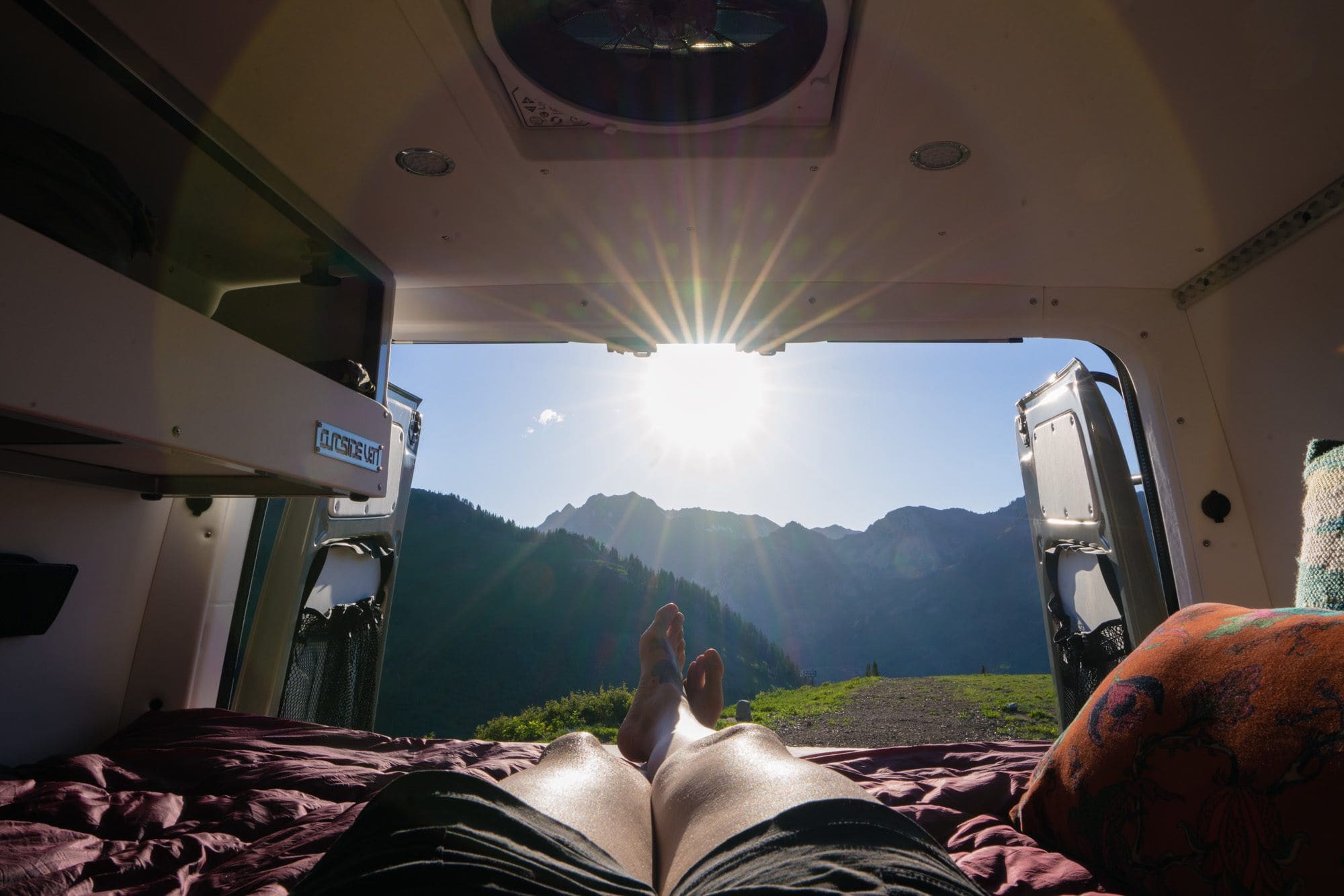
Are you leaning toward a DIY van build or are you thinking about hiring a camper van conversion company to do it for you? In this blog post, we’ll discuss some considerations as well as the pros and cons of each to help you decide what’s right for you.
No matter which route you take, remember that designing your van shouldn’t be a rushed process. Once it’s built, it’ll be difficult and likely costly to make changes. I’ve worked with two different companies on three different custom van conversions, and each took nearly a year from ordering a new 4×4 Sprinter to having it converted and ready for the road. If you don’t have the patience for this, then buying an already converted, ready-to-go van (which we discuss below as well) might be your best route.
Let’s discuss some considerations for a DIY van build vs hiring a camper van conversion company.

This post may contain affiliate links.
DIY Van Conversion
If you have experience building stuff, you have time, or you simply think that building out a van would be a fun and enjoyable process, going DIY can save you a lot of money. It also gives you the flexibility to change your conversion after the fact if there is something about your build you really don’t like.
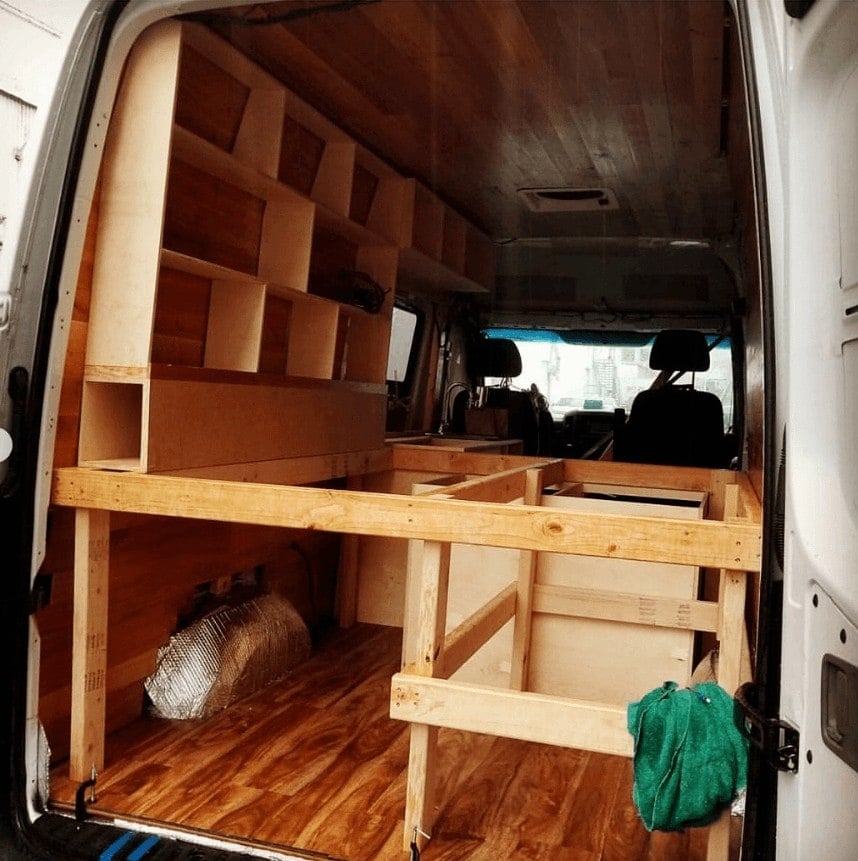

Things to keep in mind when planning to do a DIY van conversion:
- You’ll need a place to store the van and your tools as you work on it.
- Set aside more time than you think you need and have wiggle room in your budget.
- You’ll want to plan to get a bulk of the work done when the weather is good so you can comfortably be outside unless you have a large garage or other covered space to work in.
- YouTube is a great resource for all things DIY, as is the Sprinter Source Forum.
DIY Van Build Pros
- You can spend as much or as little money as you want.
- It can be a fun, bonding experience for all involved.
- Your van build will be unique and one of a kind.
- You can more easily change parts of the build later.
- You’ll be more familiar with how everything works and will be able to repair things on your own easier.
DIY Van Build Cons
- It’s more difficult to get RV insurance with a DIY build.
- It’s not a fast process so that’s something to consider if you want to hit the road within a certain time.
- The resale value is not as high as professional conversions.
- It can be a frustrating experience if you don’t know what you’re doing.
Since this is not a full-blown DIY van build course, I’ll share a few links in the resources section at the end of this lesson that will be helpful to those of you considering DIY.
Save this post!
Enter your email & I'll send this post to your inbox! You'll also receive my weekly newsletter full of helpful advice for planning your adventures.
Hiring a Van Conversion Company
Now, let’s talk about working with a conversion company.
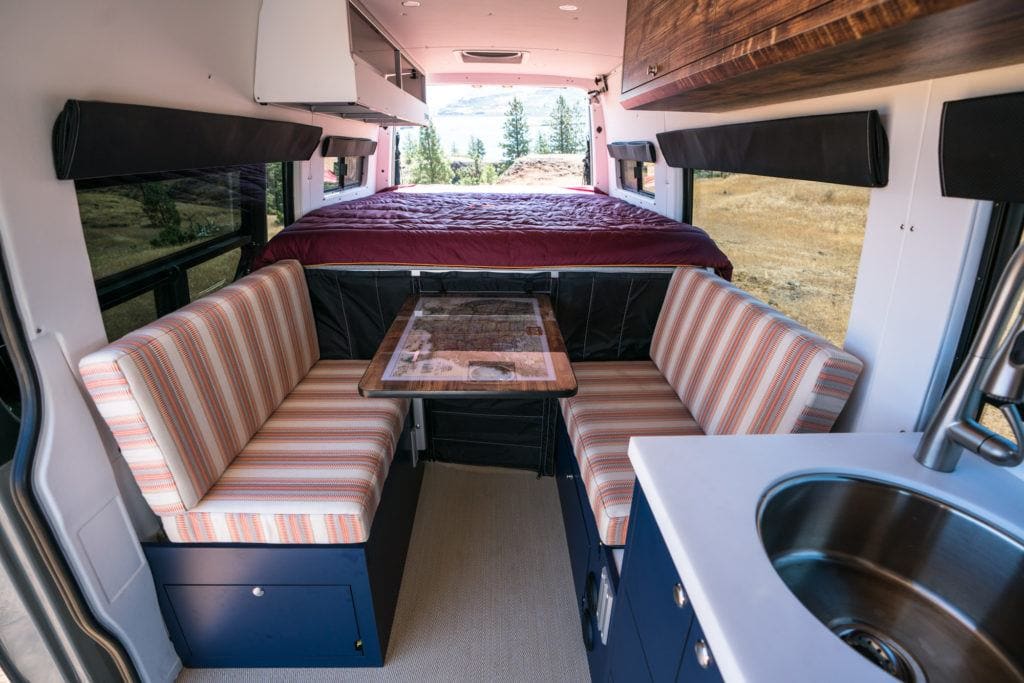
When I was in this process with my first van, I lived in an apartment with no garage/driveaway or tools, nor do I consider myself a handy person. I knew that doing a DIY job would be frustrating, take forever, and probably end up being rather expensive due to mistakes made along the way and all of the new tools I’d have to acquire. I was also working 60+ hours a week trying to grow my blog into a sustainable business, so I decided that building a DIY van was not a good use of my time or resources. For these reasons, I decided to hire a professional conversion company for both of the Sprinter Vans I’ve owned.
The downside of hiring a professional is the upfront investment. Going with a builder is simply going to be more expensive. Second, if you decide you don’t like something about your conversion, you’re not going to want to rip it out and change it, like you could if you DIYed. Finally, there are a lot of inexperienced van builders popping up all over the place who are charging top dollar for van conversions they don’t even know will last. If you don’t do your homework, you could be overpaying and end up with a low-quality product.
Hiring a Van Conversion Company Pros
- It’s easier to get RV insurance.
- You’re more likely to have a professional grade job done.
- Professional van builds hold their value better than DIY vans.
- You’ll have more time for other things like family and work.
Hiring a Van Conversion Company Cons
- It’s more expensive.
- It’s harder to change something you don’t like after the conversion is done.
- You likely won’t be as familiar with how everything is set up, so you’ll likely have to pay to have things fixed rather than being able to do it yourself.
If you’re thinking about hiring a conversion company to build out your van, be sure to read our tips for screening a van conversion company so you don’t make some of the mistakes I made when I hired a conversion company for my first van.
Buying a Professional Pre-Built Van
Rather than a completely custom conversion which requires time, money, and a lot of decision making and expertise, another option is purchasing a professionally built-out van with a proven layout.
There are a variety of companies out there that offer vans like this, but Storyteller Overland is a personal favorite. We first saw their vans in person at Open Roads Fest in 2019 and were blown away by how sturdy, practical, and ready for adventure they were. Since then we’ve gotten to know them well and the people behind the brand are as amazing as the vans they build. They have been a big supporter of the van life community since the beginning and helped make many of the free van life resources you’re reading here possible.
Storyteller Overland’s vans are versatile and ready for adventure so you can hit the road sooner. They’re easy to finance and insure and are especially great if you’re interested in buying a new van but are wary about the time, money, and uncertainty that go into a custom conversion. Check out Storyteller Overland’s MODE 4×4 adventure vans here and see them in action on Instagram.
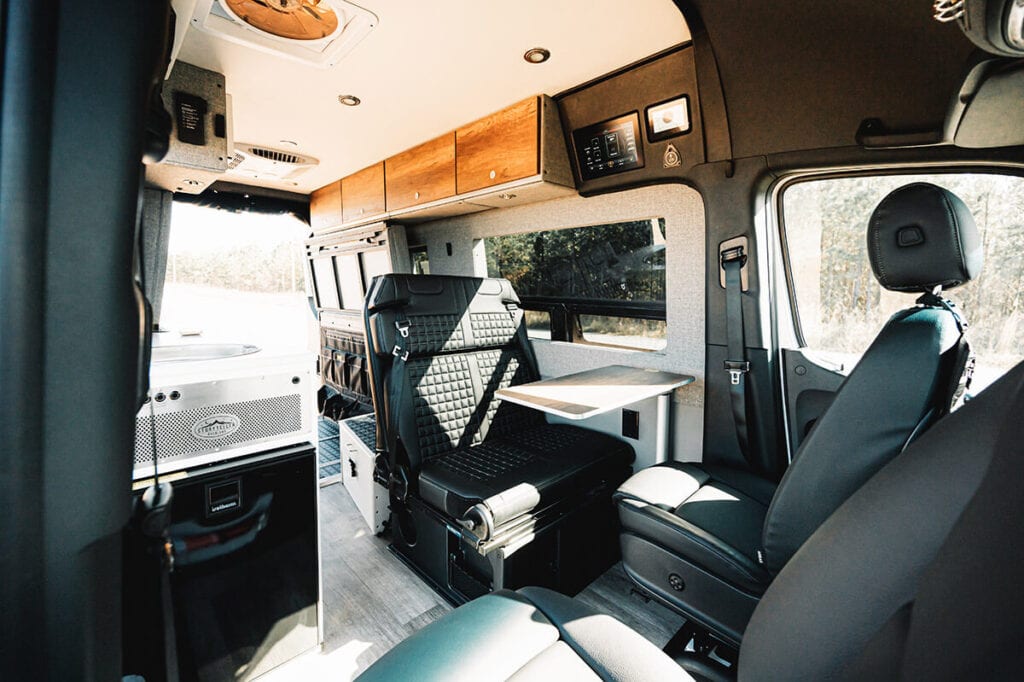
Resources Section
Van Conversion Companies I Stand Behind
- Outside Van (the company that built my current van and previous van)
- Storyteller Overland
Helpful DIY Van Build Blogs:
Did you decide to DIY your van build or hire a conversion company to build your van? Share your tips and experiences in the comments below and make sure to sign up to receive free van life resources via email!

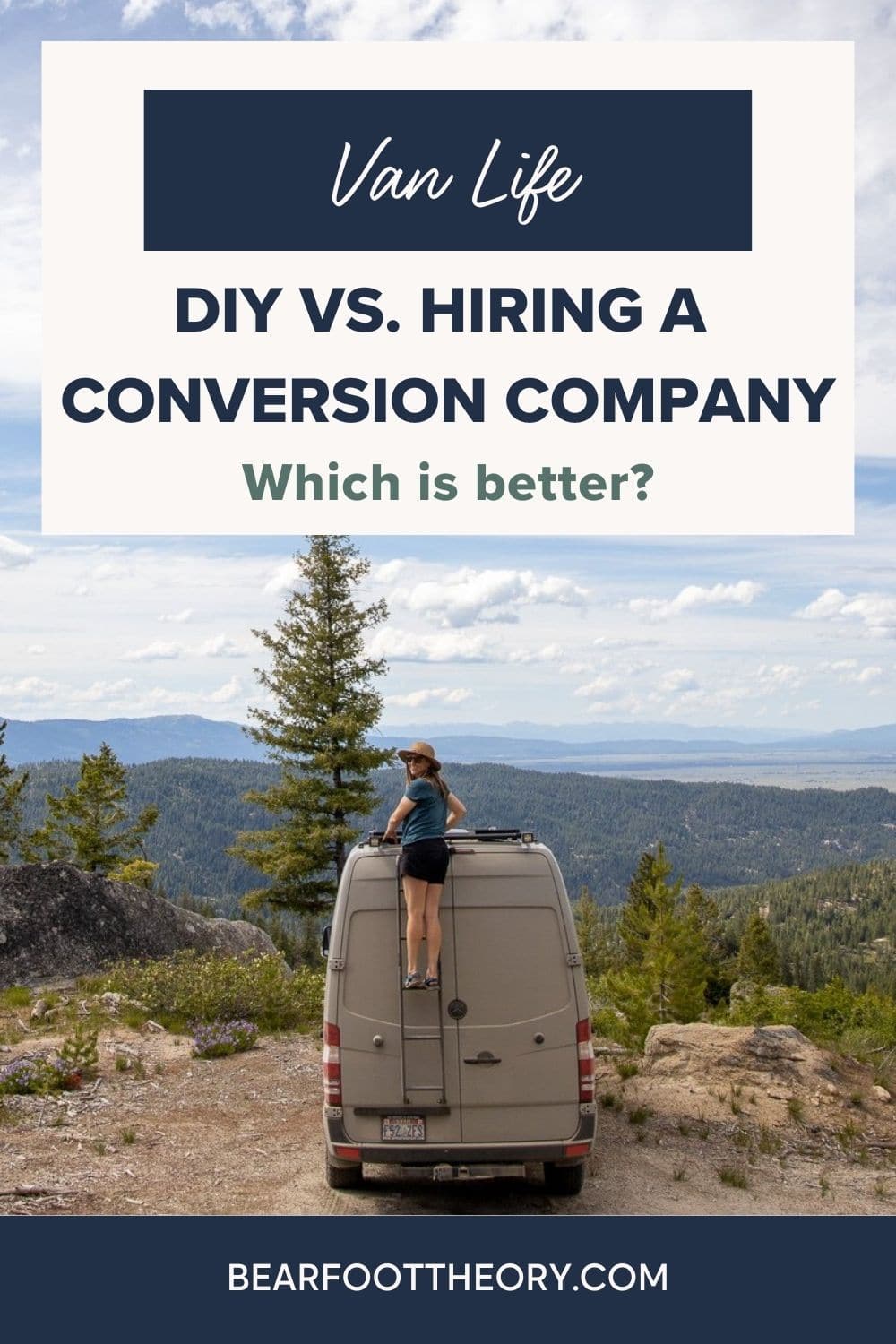
Hey!! I’ve been barking with this question for a while now. Still at it, actually. Haha. But I came across the Storyteller last week and my world got flipped upside down. It’s pricey af, but it’s downright awesome. May I ask why you didn’t go with one of them? (Or a revel)
Storyteller’s vans are awesome! Kristen went with Outside Van when she had her van built out back in 2018 because she wanted something custom that would bring her own vision to life. We also didn’t know Storyteller back then. They are definitely a great option for a ready to go adventure van without having to go through the entire custom design process. They are pricey, but you get what you pay for and they are less expensive than some of the custom conversion pricing we’ve seen out there. Whatever you decide best of luck!
Thanks for the shout out! Great article on the pros and cons of building vs buying. We always encourage campers to hire a professional for tasks they don’t feel comfortable taking on themselves – this was a good reminder of the other benefits 🙂
Thanks Kate! You guys have some great resources on this topic and we’re happy to share them 🙂
I noticed you mentioned RV insurance. which is why I am asking the following.
I am NOT looking to build an RV. RV not legal to park on city streets here. My focus is to stay inside of 20ft length and no more than 8ft overall. There are a few parking restrictions for this though related to angle parking and so many ft from intersection. where I am.
My focus is insulation, power generation and storage, and climate control. where the back is kept mostly empty as cargo van. with racks for tote bins.
Can you get away with personal use insurance for in city? in MN when not doing full blown rv conversion?
My build design is technically still a cargo but with upgraded electrical system and secondary heating and secondary secondary solar roof, to keep sun off van when parking in direct sun. with awning that go almost straight down and hooks onto a runner board to keep sun off side of van. (passive cooling climate control.) by using permanently mounted shade for roof and hook on tarp or awning material for side shade with moon cut air holes to allow air flow, also pointless to use as rain awnings so theft less likely.
remove the passenger seat. place 2 agm(1 starter for van, second dedicated battery for charging and jump starting. battle born 2 banks 2-100ah internally heated batteries (new this November) in each bank alternating for charge cycle efficiency and longevity with constant power draw for climate control and other use. . 6 batteries all together. 2 BCDC redarc 50amp b2b chargers with built in solar controller that lets you charge from solar and alternator at same time does it automatically. Add a secondary independent from van high amp output at idle with triple heat protection alternator to run solely the 100amp charging system. Idea is to get alternator that can do 3 times output to use for continuous charging. 12 rectifiers instead of 6 and other more heavy duty options in alternator. (victron energy has video on what to look for in continuous use alternator applications for charging lifepo4 batteries.) I am using charger to control amp draw, so as to limit how much power total charging will pull from alternator. reason for 2 chargers is to cut charging time in half for in city driving where you have to move every 12 hours or so. Add 4 – 300watt merlin solar panels to custom secondary roof (Solar panels with tremendous redundancy and efficiency. often used on satellites and converted for civilian automotive use and other applications. )
The reason for 2 battery banks instead of one big one is in how the power is used and your charging profile. Continuous use power draw 24-7 combined with short session drive times(alternator charge cycles) will not fill nearly 200 USABLE amp hours in one go. charge cycle is measured in charging over time without discharging in between each short charge session. If I charge only to 1/2 full then discharge before charging again this gets counted as 1 full cycle from battery life. This significantly shortens battery life overall. So you deplete one bank while the other is being charged over time by multiple short charging sessions till full . Then when the first bank is depleted you flip switches to transfer full bank with discharged bank. This allows you to charge a bank fully over multiple partial charge sessions and gets the most out of battery life.
Climate control is popup vents between the van roof and secondary roof. fans blowing out or in depending on location,
5-10 gal diesel tank mounted directly to floor in cab over rear axel. to feed diesel cab heater. Most likely portable diesel heater for trucks from vvkb If van is gas engine. If diesel I can tap diesel tank below. I am reluctant to go diesel van after so many with diesel vehicles was crippled last winter due to freeze in MN when city was shut down. VVKB 5kw uses 2.2 amps electrical draw and is self cleaning of diesel soot. I don’t like the idea of driving around with fuel can full of fuel in cab. it is less safe than mounting tank to floor. The heater tank only gets you 14 hours of heat Which is reason for larger tank of 5-10 gal.
the modifications are not included in book value, because of it being DIY. With liability insurance only. MN is no fault injury, and at fault collision damage. Modifications will in no way impact vehicle safety or collision risk. Modifications will not be covered by insurance. as long as not damaged it can be transferred to replacement van of same type and engine.
I am Pretty sure I am voiding some of the warranty but to me that is ok because I am doing this for survival as person with disabilities where traditional housing is too expensive It choose rent or transportation and rent is too high alone as is. Van life allows me to make disability related changes needed to van I could not do in housing due to landlords freaking out and discriminating.
The power system is more in tune with marine applications. Where I don’t have access and I am full time in extreme fluctuating weather of MN usa.
I did my own build and glad I did. I know my van inside out and can fix, adjust and change anything. With propane, solar, 200 ahr battery, 2000 watt inverter, 14 gallons of water a joolca hot water heater and a ports potty I am pretty independent. I have a microwave, a toaster oven and either a 2 burner camp chef or a one burner gas one if all I’m doing is morning coffee. I can carry (4) 10 ft longboards, wet suits and any other gear for surfing and camping. Based on a used 2008 sprinter 144 cargo van. Total cost about $55k. Check out instagram @surfvancampvan. AMSolar is an incredible partner for the electrical. I recommend victron for power system
Hi Bob, congrats on your build and thanks for sharing! Sounds like a great setup.
Thank you. It is purpose built; surfing and camping, but modular so I could opt for a big garage. Without the raised floor for longboards, we would have tons of space. My wife (I am 71, she is 62) just retired and we did our first month long trip. It all worked well and she has signed up for the adventure. I have followed your posts from the beginning so you opinion on things are appreciated. Wish you were doing a raising bed so I could get your opinion
I don’t have a choice other than do it myself. I am very limited in my funds. The perfect scenario would be a shop with tools and some expert help to make it happen. I feel like that would be middle of the road. Not sloppy throw together and not an expensive build. Simple to the point build